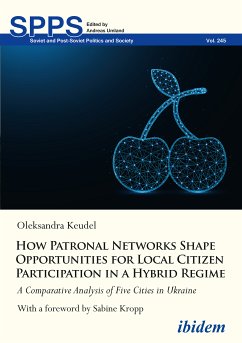Oleksandra Keudel proposes a novel explanation for why some local governments in hybrid regimes enable citizen participation while others restrict it. She argues that mechanisms for citizen participation are by-products of political dynamics of informal business-political (patronal) networks that seek domination over local governments. Against the backdrop of either competition or coordination between patronal networks in their localities, municipal leaders cherry-pick citizen participation mechanisms as a tactic to sustain their own access to resources and functions of local governments. This argument is based on an in-depth comparative analysis of patronal network arrangements and the adoption of citizen participation mechanisms in five urban municipalities in Ukraine during 2015-2019: Chernivtsi, Kharkiv, Kropyvnytskyi, Lviv, and Odesa. Fifty-seven interviews with citizen participation experts, local politicians and officials, representatives of civil society and the media, as well as utilization of secondary analytical sources, official government data, and media reports provide a rich basis for an investigation of context-specific choices of municipal leaders that result in varying mechanisms for citizen participation.
Dieser Download kann aus rechtlichen Gründen nur mit Rechnungsadresse in A, B, BG, CY, CZ, D, DK, EW, E, FIN, F, GR, HR, H, IRL, I, LT, L, LR, M, NL, PL, P, R, S, SLO, SK ausgeliefert werden.
"Why would public authorities willingly devolve to the less powerful some of the decision-making power that they struggled so hard to acquire? While some might presume that this would only happen under the pressure of strong civil society networks, Oleksandra Keudel answers this question from the perspective of local politicians. In a rare example of scholarship on citizen participation in hybrid regimes, the author plunges into the logic of patron-client networks in five Ukrainian cities to show how political leaders use participatory politics to their own benefit. Founded in rigorous comparative analysis and a sophisticated theoretical framework, her original approach illuminates a less studied side of participatory politics: not so much a bottom-up transformation, but rather a resource managed by local elites in their disputes for power."-Rebecca Abers, Professor of Political Science, University of Brasília









